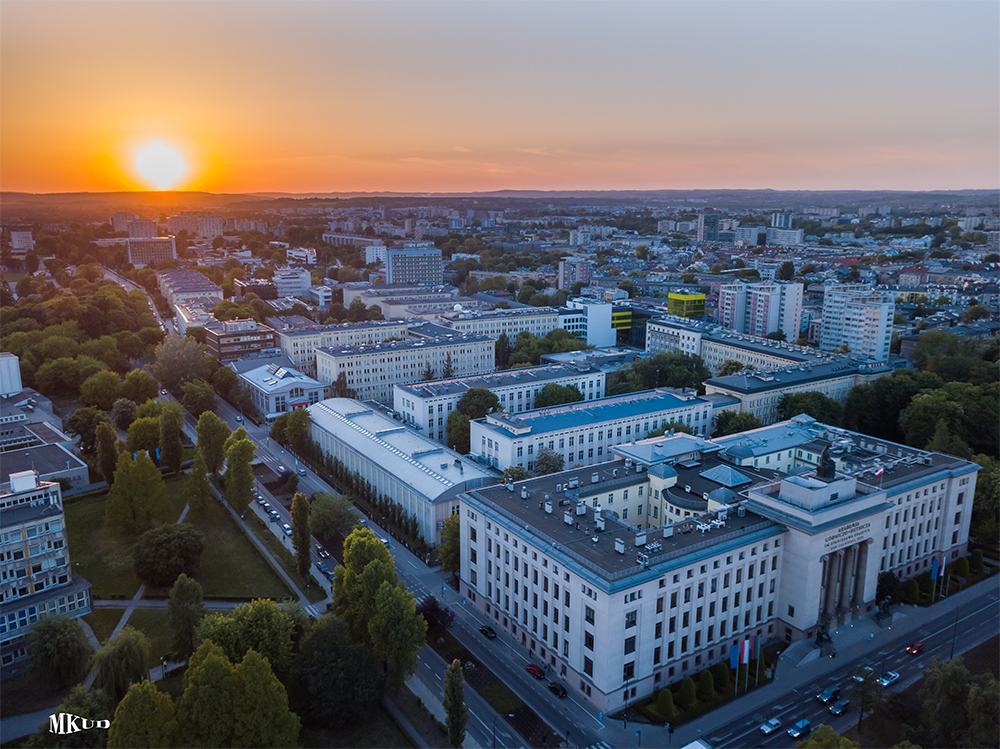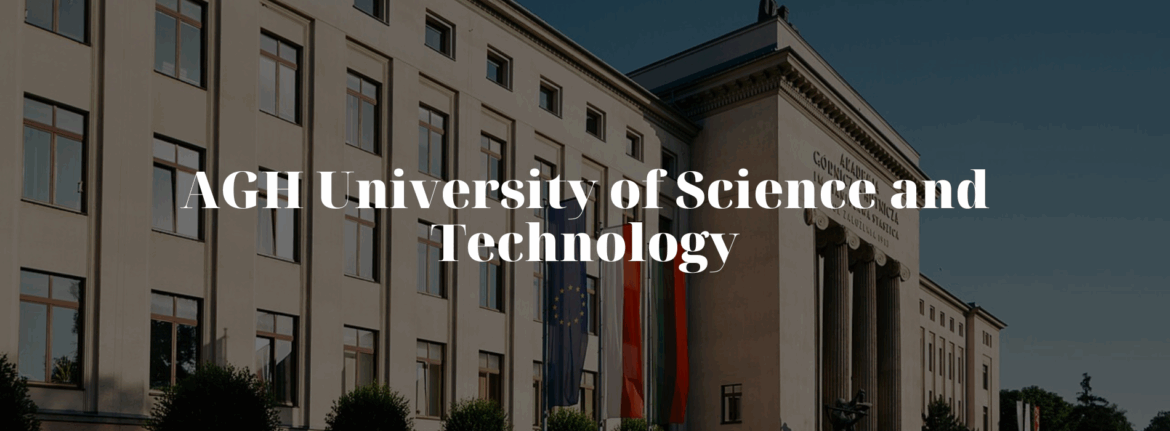In the heart of Kraków—a city famed for its history, culture, and academic legacy—stands one of Poland’s most influential technical universities: the AGH University of Science and Technology. Established in the early 20th century with a strong focus on mining and metallurgy, AGH has evolved into a multidisciplinary, research-intensive institution that continues to shape the technological and industrial development of Poland and Central Europe.

Forged in a Time of Transformation
The idea of founding a mining academy in Kraków dates back to the 18th century, when Poland sought to develop its own experts in mineral extraction and processing. However, political instability, partitions, and foreign rule delayed these plans for over a century. It wasn’t until 1913, during the Austro-Hungarian period, that Emperor Franz Joseph I officially approved the creation of the Mining Academy (Akademia Górnicza). The outbreak of World War I postponed the project, but finally, in October 1919, just months after Poland regained independence, the academy opened its doors.
The institution’s first lectures were held in the historic Collegium Novum of the Jagiellonian University, with just 80 students and a faculty of brilliant Polish scientists and engineers. Among them was Professor Jan Zarański, a mining engineer who laid the groundwork for AGH’s academic direction. In 1925, the university was granted land in the Kraków district of Krowodrza, where it began construction of a dedicated campus—an area that has since grown into one of the most modern academic complexes in Poland.
Growth through Adversity
The interwar period saw AGH develop rapidly. It became a centre for advanced research in mining technologies, metallurgy, and engineering disciplines critical to rebuilding and modernising the newly independent Polish state. However, its trajectory was tragically interrupted by World War II, during which many professors and students were arrested in the infamous Sonderaktion Krakau in 1939, and the university was shut down by the Nazis. Nonetheless, clandestine education continued, with lecturers risking their lives to teach in secret.

After the war, AGH was reopened and rebuilt with vigour. It soon added new faculties and modernised its curriculum to reflect the expanding industrial base of postwar Poland. In 1949, the university was renamed the AGH University of Mining and Metallurgy, and later, in 1999, adopted its current name: the AGH University of Science and Technology—reflecting its broadened scope beyond its original fields.
Academic Strength and Innovation
Today, AGH is a leading institution in technical education and applied research, with a dynamic campus, extensive laboratories, and global recognition. The university hosts over 20,000 students across 16 faculties, offering engineering, science, and IT programmes at the bachelor’s, master’s, and doctoral levels.
While mining and metallurgy remain its historical pillars, AGH’s present-day strengths also include:
- Computer science and artificial intelligence
- Robotics and automation
- Renewable energy and environmental engineering
- Geophysics and geology
- Materials science and nanotechnology
- Industrial management and data science
Its modern curriculum integrates strong theoretical foundations with hands-on project work, industry collaboration, and state-of-the-art technology. The university’s focus on innovation and entrepreneurship encourages students to tackle real-world challenges through interdisciplinary learning and research.
Centres of Excellence
AGH is home to a number of world-class research centres and institutes. The Academic Centre for Materials and Nanotechnology (ACMiN) conducts cutting-edge research in materials science, while the Centre of Energy leads national and EU-funded projects on energy transition, nuclear energy, and climate technologies.
One of the university’s flagship initiatives is the AGH Data Center, one of the most advanced computing hubs in the region, supporting big data analysis, machine learning, and scientific simulation. AGH is also actively involved in the European Space Agency’s programmes, contributing to satellite research and cosmic materials studies.
Thanks to these initiatives, AGH maintains a leading role in Poland’s scientific ecosystem and is consistently ranked among the top Polish universities in international indexes such as QS and Times Higher Education.
A University Built for the Future
The AGH campus, located in central Kraków, is known for its blend of historic buildings and futuristic laboratories. Its vibrant academic and student life makes it one of the most desirable places to study in Poland. With a strong international presence, AGH offers over 20 programmes in English and maintains partnerships with universities across Europe, North America, and Asia.
The university is a member of the T.I.M.E. network (Top Industrial Managers for Europe) and the European University of Technology (EUt+) alliance. It participates in Erasmus+ exchanges, joint degrees, and collaborative research, fostering global academic mobility and multicultural engagement.
Industry Ties and Real-World Impact
What sets AGH apart is its deep connection to industry. The university works closely with sectors such as:
- Mining and resource management
- Metallurgical and materials industries
- IT and cybersecurity
- Energy and sustainability
- Construction and infrastructure
Companies like KGHM Polska Miedź, Orlen, ABB, IBM, and Microsoft partner with AGH on research, development, and recruitment. Students often participate in internships, sponsored projects, and competitions, gaining valuable experience and professional networks even before graduation.
Additionally, AGH supports student entrepreneurship through its Centre for Technology Transfer (CTT) and Academic Incubator, helping young innovators turn ideas into startups.
Comparing AGH with Global Technical Universities
AGH resembles institutions like Colorado School of Mines (USA) or Montanuniversität Leoben (Austria) in its original focus on mining and earth sciences. However, its transformation into a broader science and technology university also places it on par with schools like Aalto University (Finland) or TU Delft (Netherlands) in terms of research diversity and international outlook.
Compared to Western European counterparts, AGH offers affordable tuition, especially attractive to non-EU students, while maintaining high academic standards and strong employability outcomes. Its focus on applied science gives graduates a competitive edge in technical job markets across Europe.
Kraków: A Unique Student Experience
Studying at AGH also means living in Kraków—Poland’s cultural and intellectual capital. With its mix of Gothic architecture, lively student scene, and UNESCO-listed Old Town, the city offers an inspiring backdrop for academic pursuits. AGH contributes significantly to Kraków’s reputation as a knowledge economy hub, alongside institutions like the Jagiellonian University and numerous R&D centres.
Events such as AGH Days, Science Festivals, and student hackathons create a lively atmosphere on campus. Student organisations, including technical clubs, choirs, and sports teams, further enrich the university experience.
From Coal to Code: A Legacy Reimagined
From its early days as a mining academy to its current status as a powerhouse of Polish science and technology, AGH University of Science and Technology represents the country’s ability to adapt, innovate, and lead. Rooted in tradition but always forward-thinking, it equips students not only to understand the world’s raw materials but to engineer its digital and sustainable future.
For those interested in studying in Poland, collaborating on advanced research, or simply discovering one of Europe’s most dynamic academic institutions, AGH offers both legacy and possibility—solid as steel, and just as forward-moving.
